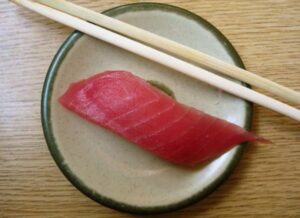Alarming Levels of Mercury Found in California Fish

In a covert 2010 investigation titled “Operation Safe Seafood”, GotMercury.org, a non-profit advocacy group working to protect people and the environment from mercury, revealed startling levels of the toxin found in fish served in restaurants and grocery stores across California. The recently released report also noted negligent restaurants and retailers who did not post visible warning signs about mercury prone seafood, which is especially risky for pregnant women and children.
According to the report, “The most significant point of this sampling is that nearly one-third of the fish purchased at grocery stores contains levels of mercury the United States has deemed unsafe for consumption and more than half of the retailers did not post mercury advisory signs.”
Another startling finding revealed that 81 percent of swordfish samples showed high levels of mercury with nine of those samples registering at more than two hundred times over the maximum acceptable levels of mercury set by federal officials.
In a joint health advisory about methylmercury in seafood, both the FDA and EPA have warned women and children to limit consumption of tuna and to eliminate swordfish and shark as well. Currently, no federal requirements exist to oblige retailers and restaurants to post signage warning against mercury.
Tainted fish is the most common cause of mercury poisoning, which can cause neuropathy, rapid heart beat, hypertension, hair loss, skin rashes, kidney failure, insomnia, memory loss and death. Mercury gets into water streams through pollution caused by the burning of fossil fuels.
GotMercury.org recommends making mercury-poisoning risks avoidable by educating consumers. Their report suggests that, “In absence of federal leadership, California should enact legislation that requires point-of-sale mercury-in-fish warnings in grocery stores and restaurants that that sell high-mercury seafood.” They also suggest that restaurants, chefs, and consumers should stop serving, buying, selling and eating endangered bluefin tuna. They also urge Eco-labeling on any California sourced seafood to take into account mercury levels saying also that “seafood high in mercury or other toxins should not receive sustainable certification.”
Keep in touch with Jill on Twitter: www.twitter.com/jillettinger
Photo: WordRidden

